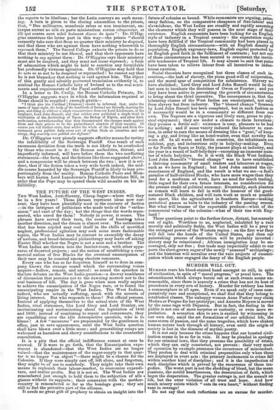MURDER WILL OUT.
MURDER rears his blood-stained hand amongst us still, in spite of civilization, in spite of "moral progress, ' or penal laws. The astonishment which always bursts out at such events seems un- reasonable, since there is scarcely a crime that has not its host of precedents in every tent of history. Murder for robbery has been a commonplace in all ages. Even if we speak only of cases com- paratively rare and exceptional, we shall find that they belong to established classes. The unhappy woman Anne Parker may claim Medan or Progne for her prototype; and Annette Meyers is moved by the same rage with Dejanira. But in fact, the feeling in the public is not one of mere surprise or curiosity, or even mere re- probation. A sensation akin to awe is excited by witnessing in our own day, amid the set formalities of our artificial life, the snowstorm of passion, and the same tragedies, which have shaken human nature back through all history, even until the origin of society is lost in the dimness of mythic poetry.
It is not only because the crime happens that our boasted civil- ization seems to be so far in vain. It may be pleaded in apology for our criminal laws, that they presume the possibility of crime, which they can only counteract, not prevent : their very mode of operation by example presumes the occurrence of misconduct. They profess to deal with criminal propensities only when those are displayed in overt acts : the primary incitements to crime fall within another kind of discipline ; and it is the imperfection of such discipline which is proved by the recurrence of these tra- gedies. The worst part is not the shedding of blood, but the mean passions, the sordid heartlessness, the desecration of faith, which beget the desperation. The greater outrage is, not the assault on life, but the utter violation of all trust and hope. And how' much misery exists which "eats its own heart," without finding vent in revenge!
Do not say that such reflections are an excuse for murder. That is not the point. To neglect the present and practicable duty of checking murder because we see that a more abiding and larger duty is neglected, would be as irrational as to neglect pro- viding for the special duty of national defence because the general expenditure of the Army has been placed on a bad system. Nor say that we are now discussing only the self-incurred miseries of the lawless and profligate. Perhaps they may draw upon them- selves suffering sharper and more obvious; but if many an An- nette Meyers sinks unrevenged, many a Henry Ducker carries on his heartless scepticism, his moral atheism, without infringing set rules. Many a home grows familiar with pale despondency, and almost envies these lawless natures the sharp relief of open crime. We may say that it is but the identity of human nature which places us in some matters just where we were at the beginning of social history : a very idle way of evading the duty of moral effort. A more probable reason for the continuity is, that while the practical moralist has attempted specific measures to regulate political institutions, civil rights, the acquirement of knowledge, and religious discipline, the training of the elementary affections has been left to the theorist, the artist, the poet, oftener to acci- dent. There are many reasons for the neglect. The omitted duty is difficult. Dogmatic morals, sometimes from running counter to nature, sometimes from too weak a disposition to shut the eyes to an evil rather than master it, have had a tendency to make professed teachers ignore the elementary emotions of human nature. Considerable part of most existing laws is framed in some such deliberate ignorance. Observe the remarkable fact, that in the case of Annette Meyers, only her share of misdeed falls within the cognizance of our set discipline; yet hers was not the larger share of the outrage against right. The true moral to draw from the identical recurrence of these ancient tragedies is, that our civilization is vain where we have neglected to cultivate it. The value of human life lies in the de- velopment and enjoyment of the affections—the most selfish ma- terialist will admit that, at some mortal crisis of his career; and yet that is the part of human capacity which we the most stu- diously neglect to cultivate in education or to protect by law. We have laws to protect life, and Annette Meyers will feel them ; we have laws to protect society from breach of its set institutions, individuals from breach of contract ; we can force back a shrink- ing wife to a husband whose " cruelty " does not fall within the definition of the Ecclesiastical law, but merely inflicts hopeless wretchedness on a gentle and trusting heart ; we protect right in material property : but that which is most precious is almost un- protected by law, and unnoticed by our moral system. Is it wonderful that we have a strange " conflict of laws," or that our civilization is rebuked by deadly tragedies?



























 Previous page
Previous page